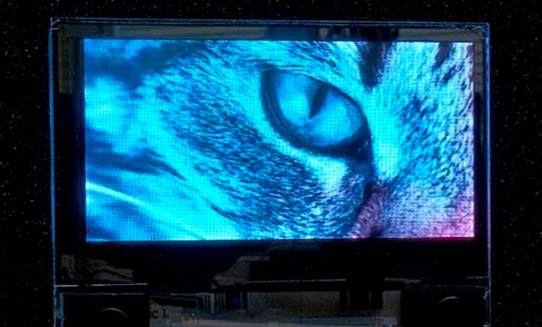- News
9 May 2019
X-Celeprint implements BluGlass’ RPCVD p-GaN technology in high-performance micro-LED display prototypes
BluGlass Ltd of Silverwater, Australia (which was spun off from the III-nitride department of Macquarie University in 2005) and its foundry customer X-Celeprint of Cork, Ireland – a subsidiary of XTRION N.V. of Tessenderlo, Belgium that uses facilities at Ireland’s Tyndall National Institute and in Research Triangle Park, NC, USA to develop and license patented micro-transfer printing (μTP) and related technology – have implemented BluGlass’ unique remote-plasma chemical vapor deposition (RPCVD) p-GaN technology in high-performance micro-LED display prototypes.
BluGlass is commercializing its proprietary RPCVD technology in the LED, micro-LED and power electronics industries, for which patented hardware and processes are claimed to offer manufacturers unique performance advantages due to its low-temperature and low-hydrogen growth conditions.
X-Celeprint is using RPCVD deposition for its unique technology demonstrations. X-Celeprint’s active-matrix micro-LED displays that use RPCVD p-GaN have demonstrated luminance with colour uniformity, quantum efficiency and forward voltage that equals existing high-performance commercial applications of 2000cd/m2.

Picture: X-Celeprint’s 2000cd/m2 micro-LED display, using RPCVD p-GaN, showing good colour uniformity quantum efficiency and forward voltage.
X-Celeprint (which provides custom design services for micro-transfer printing stamps and printers) says that its μTP is a cost-effective and scalable manufacturing platform for integrating microscale devices such as lasers, LEDs or integrated circuits onto non-native substrates. The firm has been a long-standing customer of BluGlass’ foundry services and was the first adopter of RPCVD for micro-LED demonstrations.
“X-Celeprint works with BluGlass to demonstrate our micro-transfer printing capability for micro-LED displays,” says X-Celeprint’s VP of displays Matt Meitl. “BluGlass’ creativity in epiwafer design, unique capabilities in epitaxial growth, and dedication to continued product improvement make them a valuable development partner. We continue to use these advantages in our micro-LED development,” he adds.
“It’s rewarding, after many years of developing RPCVD p-GaN, to see our technology being trialed in customer devices, particularly for the emerging micro-LED display market,” comments BluGlass’ chief technology officer Dr Ian Mann. “This micro-LED prototype demonstrates good performance, and X-Celeprint are seeing the advantage of using RPCVD in their innovative products.”
X-Celeprint continues to use BluGlass’ RPCVD foundry services (early-stage, fee-for-service revenue) to advance the technical demonstrations of its active-matrix micro-LED displays, and is actively marketing its high-performance display technology in the emerging micro-LED market.
BluGlass RPCVD Transfer printing Tyndall


